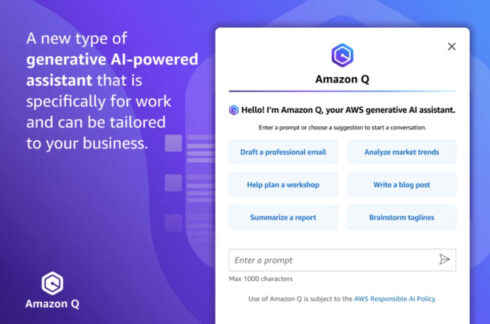
Amazon re:Invent continues today, and so does Amazon’s list of announcements. Here are some of the announcements the company made today at the event:
Amazon Q AI assistant announced
Amazon Q is a new generative AI-based assistant that is designed to help employees complete tasks related to their jobs. For example, it can help a developer build, deploy, and operate workloads, or help a call center employee create responses to say to customers.
“Amazon Q could detect a customer is contacting your rental car company to change their reservation. It would then generate a response you could send, detailing the company’s change policies and guide you through the step-by-step process of updating the reservation,” the company explained.
It leverages a company’s information repositories, code bases, and enterprise systems to better understand a company’s specific needs and provide accurate information.
RELATED CONTENT: What Amazon announced at AWS re:Invent 2023 Day 1
Amazon Bedrock updated with guardrails, knowledge bases, and more
The generative AI platform was improved with a number of different features. Customers can now implement guardrails to ensure applications built using Amazon Bedrock align with responsible AI principles.
It can also now make use of knowledge bases, which helps it provide customized and up-to-date responses.
The company also added agents to the platform, which allow the application to use the company systems and data sources to perform business tasks that require multiple steps.
And finally, the company added new ways to customize the training models that Amazon Bedrock uses. It added support for fine-tuning in the Cohere Command, Meta Llama 2, and Amazon Titan models, and support for Anthropic Claude will be available soon.
AWS releases next-gen chips
The company released two families of chips: one for AWS Graviton4 and one for AWS Trainium2. According to the company, these innovations are designed to support a variety of different workloads, such as machine learning training and generative AI applications.
Compared to the current generation, the new Graviton4 chip provides up to 30% improved compute performance, 50% more cores, and 75% more memory bandwidth. The Trainium2 chips provide four times the performance in training compared to its first generation chips, according to AWS.
AWS S3 Express Zone One announced
This is a new storage class in S3 designed for latency-sensitive applications. It provides 10 times faster data access speeds compared to the Standard class, and reduces costs by up to 50% as well.
“Millions of customers rely on Amazon S3 for everything from low-cost archival storage to petabyte-scale data lakes, and they want to expand their use to support their most performance-intensive applications where every millisecond counts,” said James Kirschner, general manager of Amazon S3 at AWS. “Amazon S3 Express One Zone delivers the fastest data access speed for the most latency-sensitive applications and enables customers to make millions of requests per minute for their highly accessed datasets, while also reducing request and compute costs.”
Four new zero-ETL integrations released
Amazon Aurora PostgreSQL, Amazon DynamoDB, and Amazon RDS for MySQL now have integrations with Amazon Redshift. According to the company, these new integrations make it easy to connect and analyze data from Amazon Redshift databases.
The company also announced an integration between Amazon OpenSearch Service and DynamoDB. This allows customers to do full-text and vector searches on their DynamoDB data.
“In addition to having the right tool for the job, customers need to be able to integrate the data that is spread across their organizations to unlock more value for their business and innovate faster,” said Dr. Swami Sivasubramanian, vice president of Data and Artificial Intelligence at AWS. “That is why we are investing in a zero-ETL future, where data integration is no longer a tedious, manual effort, and customers can easily get their data where they need it. The new integrations announced today move customers toward this zero-ETL future, and we are continuing to invest in this vision to make it easy for customers to integrate data from across their entire system, so they can focus on driving new insights.”






